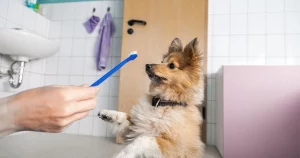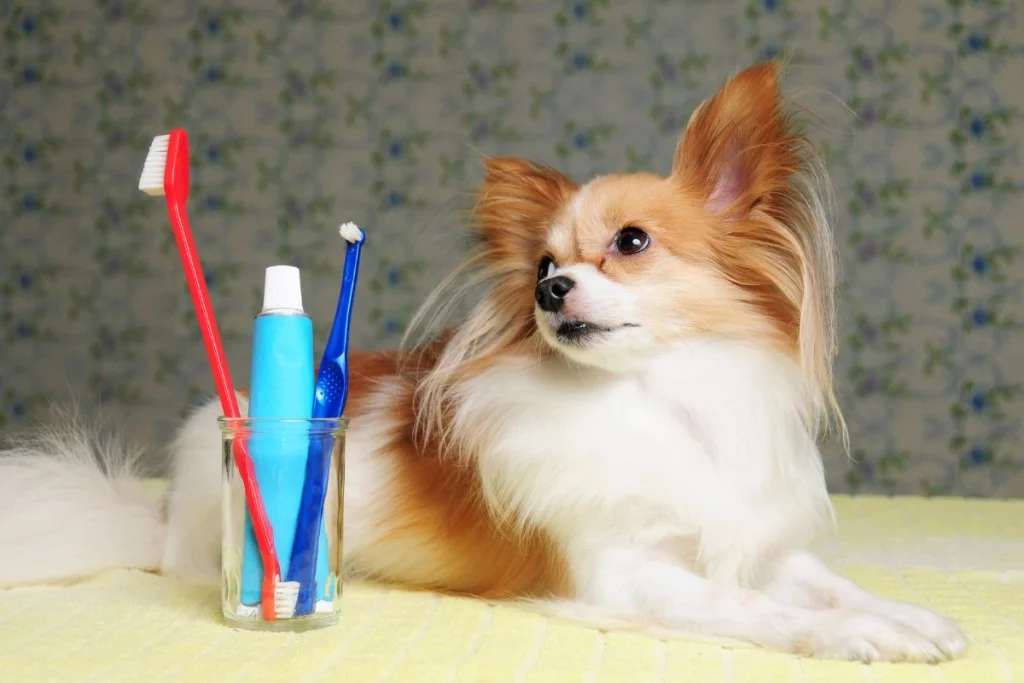Pet dental hygiene is often overlooked, yet it plays an essential role in their overall health. Many pet owners are unaware of the common dental issues that can arise without proper care. Simple daily routines can greatly improve a pet’s dental condition. Understanding these practices can lead to a happier, healthier life for pets. What are the most effective strategies to guarantee their teeth and gums remain in top shape?
Key Takeaways
- Brush your pet’s teeth daily with animal-specific toothpaste to prevent plaque buildup and promote oral health.
- Provide dental chews and toys to reduce tartar and enhance chewing, which stimulates saliva production.
- Schedule regular veterinary check-ups for professional cleanings and early detection of dental issues.
- Monitor your pet’s diet, choosing high-quality kibble that supports oral health and prevents tooth decay.
- Make dental care fun by incorporating brushing into playtime and using flavored toothpaste for a positive experience.
Understanding the Importance of Pet Dental Hygiene
While many pet owners may overlook dental care, understanding the importance of pet dental hygiene is essential for ensuring the overall health and well-being of their furry companions. Regular dental care not only prevents bad breath but also reduces the risk of serious health issues that can arise from neglected teeth and gums. By implementing simple pet dental hygiene tips, such as daily brushing, providing dental treats, and scheduling regular veterinary check-ups, owners can greatly enhance their pets’ quality of life. Furthermore, fostering a routine of dental care helps create a deeper bond between pets and their owners, reinforcing the shared commitment to their health. Ultimately, prioritizing dental hygiene is a crucial step in nurturing a happy, healthy pet.
Common Dental Issues in Pets
Understanding common dental issues in pets is vital for pet owners aiming to maintain their companions’ health. One prevalent concern is periodontal disease, characterized by gum inflammation and plaque buildup, which can lead to tooth loss if untreated. Another issue is tooth decay, often resulting from poor dental hygiene and an inadequate diet. Pets may also suffer from fractured teeth, typically caused by chewing on hard objects or trauma. Bad breath can be a sign of underlying dental problems, indicating the need for immediate veterinary attention. By recognizing these common dental issues, pet owners can take proactive steps to guarantee their pets receive proper care and enjoy a healthier, happier life. Implementing effective pet dental hygiene tips is essential for prevention.
Effective Daily Dental Care Routines
To combat the common dental issues faced by pets, implementing effective daily dental care routines is essential for maintaining their oral health. Pet owners can start by incorporating regular tooth brushing into their pets’ routines, using toothpaste specifically designed for animals. Additionally, providing dental chews or toys can help reduce plaque buildup while satisfying pets’ chewing instincts. Monitoring a pet’s diet is also important; opting for high-quality kibble can contribute to better oral hygiene. Regularly inspecting the pet’s mouth for signs of dental problems can foster early intervention. By dedicating a few minutes each day to these simple pet dental hygiene tips, owners can considerably enhance their furry companions’ health, happiness, and overall quality of life.

Professional Dental Cleanings: When and Why
When considering the overall health of a pet, professional dental cleanings play an essential role in preventing serious dental issues. Many pet owners may underestimate the importance of these cleanings, yet they are vital for removing tartar and plaque buildup that regular brushing may miss. Veterinary professionals recommend scheduling a dental cleaning at least once a year, or more frequently for pets with existing dental concerns. In addition to enhancing oral health, these cleanings can prevent painful conditions, such as periodontal disease, which can lead to systemic health problems. By prioritizing professional dental care, pet owners contribute to their beloved companions’ long-term well-being and happiness, ensuring they enjoy a healthy life filled with companionship and joy.
Fun Ways to Encourage Your Pet’s Dental Health
Regular professional dental cleanings lay a strong foundation for a pet’s oral health, but maintaining that hygiene at home can be equally important. Engaging pets in enjoyable activities can make dental care more appealing. For instance, pet owners can introduce dental chews that are both tasty and effective at removing plaque. Interactive toys that promote chewing can also stimulate saliva production, further aiding in dental health. Additionally, incorporating brushing into playtime can create a positive association with dental hygiene. Flavored toothpaste designed for pets can enhance this experience, making it feel less like a chore. By integrating these fun methods, pet owners can foster a sense of belonging and connection, ensuring their pets maintain ideal dental health while enjoying the process.
Frequently Asked Questions
What Are the Signs of Dental Pain in Pets?
Signs of dental pain in pets include reluctance to eat, excessive drooling, bad breath, pawing at the mouth, and behavioral changes. Observing these symptoms can guide owners in seeking timely veterinary care for their beloved companions.
Can Dental Treats Replace Brushing for Dental Hygiene?
The question of whether dental treats can replace brushing arises frequently. While dental treats can aid in maintaining oral health, they should complement, not substitute, regular brushing for ideal pet dental hygiene tips and overall well-being.
How Often Should I Check My Pet’s Teeth?
Regular checks of a pet’s teeth should occur at least once a week. This routine helps identify potential dental issues early, fostering better health and strengthening the bond between pet and owner through attentive care.
Are There Specific Breeds Prone to Dental Problems?
Certain breeds, such as Dachshunds, Chihuahuas, and Bulldogs, are particularly prone to dental problems due to their unique jaw structures. Regular dental hygiene practices can greatly improve their oral health and overall well-being.
What Home Remedies Can Help With Pet Bad Breath?
Home remedies for pet bad breath include regular dental chews, coconut oil, and parsley. These options can promote fresh breath and improve overall oral health, fostering a sense of care and connection between pets and their owners.
Conclusion
In summary, prioritizing dental hygiene is essential for the well-being of pets. By understanding the importance of oral health, recognizing common issues, and implementing effective care routines, pet owners can greatly enhance their furry companions’ quality of life. Regular professional cleanings and engaging dental activities not only promote healthy teeth and gums but also strengthen the bond between pets and their owners. A commitment to dental care guarantees that pets remain happy, healthy, and vibrant throughout their lives.
You May Also Like To Read:




